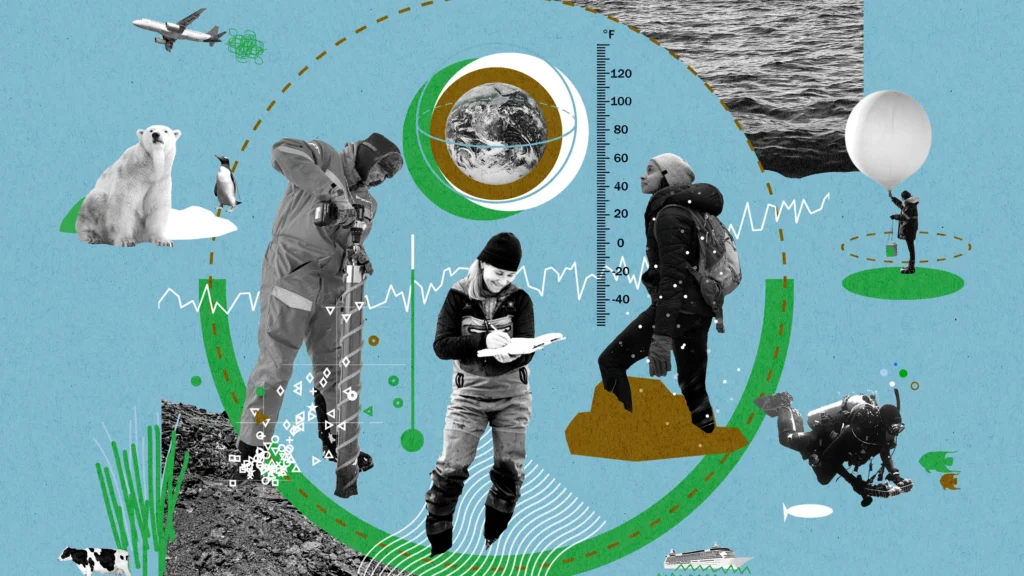Global climate change is a pressing issue that has captured the attention of the scientific community worldwide. Scientific research plays a crucial role in understanding the causes, impacts, and potential solutions to this complex problem. Through extensive data collection, analysis, and experimentation, researchers are able to uncover valuable insights into the Earth’s changing climate patterns and their effects on the environment. By studying the interactions between the atmosphere, oceans, land, and ice, scientists can provide essential information for policymakers and the public to make informed decisions about mitigating and adapting to global climate change. The collaboration between scientists from various disciplines is essential in addressing this multifaceted issue and finding sustainable solutions for the future.
Global Climate Change
Global climate change refers to the long-term alteration of temperature and typical weather patterns in a place. This phenomenon is largely driven by human activities, such as the burning of fossil fuels and deforestation, which release greenhouse gases into the atmosphere. These gases trap heat, leading to a gradual increase in global temperatures and causing widespread impacts on the environment, including rising sea levels, extreme weather events, and disruptions to ecosystems and wildlife.
Addressing global climate change requires international cooperation and concerted efforts to reduce greenhouse gas emissions, transition to renewable energy sources, and implement sustainable land use practices. It also involves adapting to the changes that are already occurring and developing strategies to mitigate the impacts on vulnerable communities and ecosystems.
Scientific Research on Climate Change
Scientific research on climate change involves studying various aspects of the Earth’s climate system, including temperature trends, atmospheric changes, oceanic patterns, and the behavior of ice sheets and glaciers. This research helps to understand the causes and consequences of climate change, as well as to develop models for predicting future changes and assessing the effectiveness of potential solutions.
Scientists use a combination of field observations, laboratory experiments, and computer simulations to gather data and test hypotheses about climate change. This interdisciplinary approach involves researchers from diverse fields such as meteorology, oceanography, ecology, and atmospheric physics, and it contributes to a comprehensive understanding of the complex interactions driving global climate change.
Impacts of Climate Change
The impacts of climate change are wide-ranging and encompass various aspects of the natural world and human society. These impacts include more frequent and severe heatwaves, droughts, and storms, as well as shifts in precipitation patterns and the distribution of plant and animal species. Additionally, rising sea levels and ocean acidification pose significant threats to coastal communities and marine ecosystems.
Furthermore, climate change has social and economic implications, as it affects agriculture, water resources, public health, and global supply chains. Vulnerable populations, including low-income communities and indigenous peoples, are often disproportionately affected by these changes, highlighting the importance of addressing climate change from a social justice perspective.
Climate Change Mitigation
Climate change mitigation refers to efforts to reduce or prevent the emission of greenhouse gases and to remove them from the atmosphere. This includes transitioning to renewable energy sources, improving energy efficiency, implementing carbon capture and storage technologies, and investing in sustainable transportation and urban planning.
In addition to technological solutions, climate change mitigation also involves policy measures such as carbon pricing, regulations on emissions, and international agreements aimed at reducing overall greenhouse gas emissions. These efforts are crucial for limiting global warming and minimizing the long-term impacts of climate change.
Adaptation to Climate Change
Adaptation to climate change involves adjusting to the new environmental conditions and minimizing the negative impacts on human and natural systems. This can include measures such as building resilient infrastructure, developing early warning systems for extreme weather events, and implementing sustainable land and water management practices.
Adaptation also requires addressing social and economic challenges, such as supporting vulnerable communities, preserving cultural heritage, and ensuring access to resources and opportunities in the face of changing climate conditions. By combining adaptation strategies with mitigation efforts, societies can better prepare for and respond to the challenges posed by climate change.
Role of International Cooperation
International cooperation is essential for addressing the global nature of climate change. This involves collaboration between countries to set emissions reduction targets, share knowledge and technology, and provide support to developing nations that are particularly vulnerable to the impacts of climate change.
The Paris Agreement, adopted in 2015, represents a significant milestone in international efforts to combat climate change by bringing together nations in a shared commitment to limit global temperature rise. Ongoing cooperation and dialogue among governments, businesses, and civil society are crucial for implementing and strengthening climate action on a global scale.
Challenges and Opportunities
Addressing climate change presents both challenges and opportunities for societies around the world. The transition to a low-carbon economy and sustainable practices requires significant investment and changes in behavior, as well as overcoming political and economic barriers. However, these efforts also offer opportunities for innovation, job creation, and improved quality of life for communities.
Furthermore, by taking action on climate change, societies can protect ecosystems, promote public health, and build more resilient and equitable societies. Embracing sustainable practices and reducing greenhouse gas emissions can lead to a more sustainable and prosperous future for current and future generations.
| Topic | Description |
|---|---|
| Global Climate Change | The long-term alteration of temperature and typical weather patterns in a place. It can refer to a particular location or the planet as a whole. |
| Scientific Research | The systematic investigation and study of materials and sources in order to establish facts and reach new conclusions. It involves the collection of data through observation and experimentation. |
SONUÇ
Global Climate Change And Scientific Research are interconnected as scientific research is crucial in understanding the causes and effects of global climate change. Through research, scientists can gather data, analyze trends, and develop solutions to mitigate the impacts of climate change. This collaboration between scientific research and climate change is essential for the sustainability of our planet.

